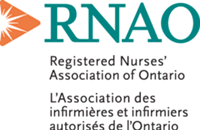Media Release: RNAO calls for limits on the use of restraints in health-care facilities
TORONTO, March 12, 2012 /CNW/ - A set of recommendations aimed at limiting the use of restraints in health-care facilities is being unveiled in Toronto Monday.
The recommendations contained in a clinical practice guideline titled, Promoting Safety: Alternative Approaches to the Use of Restraints, were developed by the Registered Nurses' Association of Ontario (RNAO).
A coroner's inquest looking into the death of Jeffrey James concluded restraints played a part in his death and called on RNAO's expertise to develop an evidence-based guideline.
James was a patient at the Centre for Addiction and Mental Health (CAMH) during the summer of 2005. He collapsed after being released following five days of physical restraints. He later died in hospital from Acute Pulmonary Thromboembolism.
RNAO sought standing at the inquest because the association has long argued in favour of client centred care, and against the reliance on physical and chemical restraints.
"Too often restraints become the default. This guideline sends a clear signal that we have to change the way we work with patients," says Irmajean Bajnok, director of RNAO's best practice guidelines program, adding that "this guideline identifies options for nurses and other health providers to ensure patient safety and independence."
Bajnok says organizations must also deploy staffing levels and models of care delivery that advance continuity of care and continuity of care givers.
Dr. Laura Wagner, one of two nurses who led the work on the guideline says there is little evidence that the use of restraints is appropriate. "RNAO's guideline provides nurses with evidence-based knowledge on alternatives to using restraints. There are many approaches that nurses and others can use prior to even considering a restraint, and the guideline provides that information based on the best research," says Wagner, assistant professor at New York University College of Nursing (Hartford Institute for Geriatric Nursing) and adjunct nursing scientist specializing in patient safety with Baycrest in Toronto.
Athina Perivolaris, co-lead on the guideline and an advanced practice nurse at CAMH believes a focus on comprehensive assessments, prevention and alternatives can play an effective role in reducing restraint use. "The use of calming strategies, sensory-based approaches and safety planning is essential in the promotion of client and staff safety," says Perivolaris, who also led a three year CAMH initiative focused on restraint prevention. "The earlier we are able to recognize clients who may be at risk of restraint use, the sooner we are able to implement strategies that prevent their use, while strengthening the relationship with the patient."
The restraint guideline is being officially released on Monday (March 12, 2012) during a webinar at RNAO's office in Toronto from 1 - 2:30 p.m.
Media are invited to join by teleconference (dial 1-877-323-2005 and key in Conference ID: 7587862) or by webinar by visiting http://chapters.rnao.ca/Least_Restraints_Launch. The launch of the guideline will include remarks by former Ontario politician Frances Lankin, whose elderly mother died as a result of being restrained. During her time as health critic for the NDP, Lankin introduced a private member's bill to govern the use of restraints. The bill was never passed into law. Lankin also served as part of the advisory team that reviewed RNAO's guideline during its development.
RNAO's Best Practice Guidelines Program is funded by the Ministry of Health and Long-Term Care, and was launched in 1999 to provide the best available evidence for patient care across a wide range of health-care settings. The 47 guidelines developed to date are a substantive contribution towards building excellence in Ontario's health-care system. They are available to nurses and other health-care professionals across Canada and abroad.
The Registered Nurses' Association of Ontario (RNAO) is the professional association representing registered nurses in Ontario. Since 1925, RNAO has advocated for healthy public policy, promoted excellence in nursing practice, increased nurses' contribution to shaping the health-care system, and influenced decisions that affect nurses and the public they serve. For more information about RNAO, visit our website at www.rnao.org. You can also check out our Facebook page at www.rnao.org/facebook and follow us on Twitter at www.twitter.com/rnao.
To arrange an interview with a nurse or for more information, please contact:
Marion Zych, Director of Communications, RNAO
Cell: 647-406-5605 / Phone: 416-408-5605
Toll free: 1-800-268-7199 ext. 209
[email protected]

Share this article